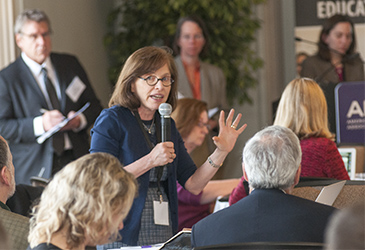Preparing future physicians for careers in the constantly changing health care system requires more than clinical skills—faculty must help medical students develop skills in adaptive learning, too.
Medical schools participating in the AMA’s Accelerating Change in Medical Education initiative are devising ways to incorporate lifelong learning into undergraduate medical education curriculum. “Master adaptive learners” will be able to learn, assess and adapt throughout their careers.
“Since it’s impossible to predict the future, training master adaptive learners is critical to ensure medical students are best prepared for their careers,” said Martin Pusic, MD, PhD, director of the division of education quality and analytics at New York University School of Medicine.
“We have no idea what medical systems will look like 10 years from now, when today’s students will enter the workforce, let alone when they’ve been in practice 20 years,” Dr. Pusic said. “By training them to be master adaptive learners, we are giving them the tools to adapt.”
NYU is implementing a new curriculum that will address the interface between education and clinical care, changing the model from a sequential one—education followed by clinical care—to a simultaneous one.
“The doctors of the future will find that educating themselves and, at the same time, improving the health care system, will be an ever greater part of their responsibilities,” Dr. Pusic said.
Facets of lifelong learning will be integrated into the Association of American Medical College’s core entrustable professional activities, a common core of behaviors that will be expected of all medical school graduates before they enter residency. Graduates will be expected to demonstrate the ability to assess when to ask for help, adopt healthy coping mechanisms, practice flexibility and more.
The new NYU curriculum will incorporate virtual patient panels, de-identified, real-time patient and practice data that students will be able to assess and compare their decision-making to actual clinical decisions. Learning from constantly changing data will improve flexibility and require students to continually assess themselves.
“If we present curricula as static things that we reform every 10 years, we will perpetuate the idea that medical knowledge is a static commodity,” Dr. Pusic said. “Instead, a continually updating curriculum that is organized around real, up-to-the-minute data from the clinical world will promote adaptive habits in both the faculty and learners. It’s these habits of learning that are indeed teachable.”
Similarly, Vanderbilt also is instilling lifelong learning in its students, who will use competency-based performance data to complete self-assessments and create their own learning goals.
“We believe that all of our students are capable of learning a set of self-regulated, self-directed learning skills with the goal of developing true learning expertise,” said Bonnie Miller, MD, associate vice chancellor for health affairs and the senior associate dean for health sciences education at Vanderbilt (pictured left). “However, like all of the competencies needed for good doctoring, the skills needed for expert lifelong learning must be deliberately taught, modeled and practiced.”
Faculty at the 11 grant schools are working to identify undergraduate education milestones to assess competency in becoming master adaptive learners, emphasizing the transitions from pre-medical education to undergraduate and graduate medical education.




